Mystery Proceeding In Mueller Investigation At Least Partly Solved
The mystery surrounding a secret proceeding in Robert Mueller's Russia investigation has at least partly been solved.
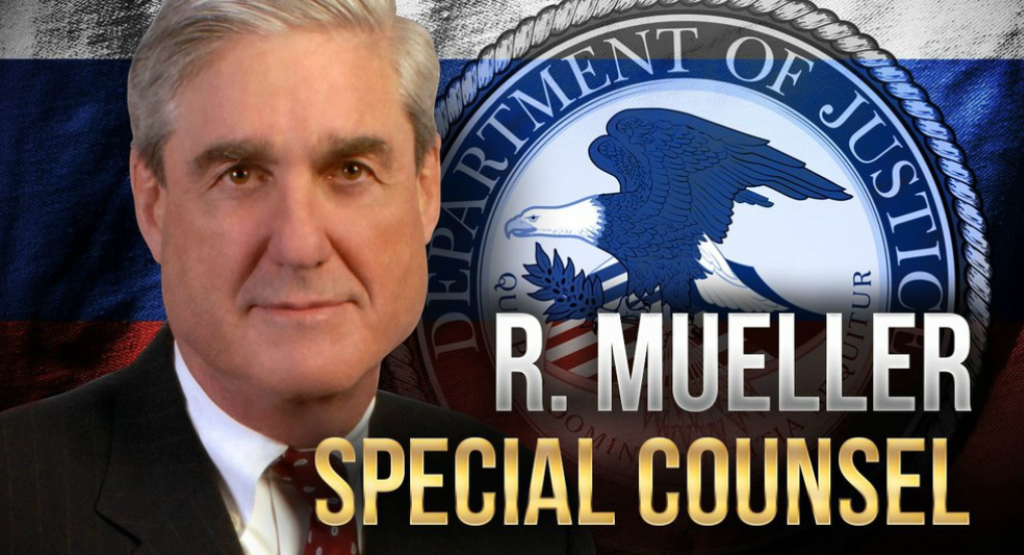
The mystery surrounding the secret proceeding in connection with Special Counsel Robert Mueller’s Russia investigation has at least been partly solved, but many questions remain:
A secret court case apparently about a grand jury subpoena from special counsel Robert Mueller’s investigation gained a little more clarity Tuesday night after a court ruling revealed the subpoena challenger is an unnamed company owned by a foreign country.
The Justice Department had asked the company to turn over “information” about its commercial activity in a criminal investigation and a federal appeals court is forcing the unnamed company to comply with the subpoena.
The ruling came four days after lawyers argued in secret for more than an hour before a panel of three appellate judges on the US Court of Appeals for the District of Columbia Circuit. The lawyers involved were never seen going into or out of that hearing on Friday, because the court security locked down an entire floor of the federal courthouse in DC for it.
But CNN had spotted attorneys from Mueller’s team returning to their office shortly after the hearing ended, and previous CNN reporting on court activity found that Mueller’s team had fought with an unknown opponent in September and October over the grand jury matter, which led to the appeal. Politico also previously reported that it had learned the sealed grand jury case had a filing in it from Mueller’s team.
The judgment from the appeals court on Tuesday carries possible fines for each day the company doesn’t comply with the subpoena.The appeals court offered few clues in its judgment about the company and its country of origin, or what Mueller’s team sought.
In one short passage in the three-page decision, the judges describe how they had learned confidentially from prosecutors that they had “reasonable probability” the records requested involved actions that took place outside of the US but directly affected the US. Even the company was not informed of what prosecutors had on this, because revealing it to the company would have violated the secrecy of the grand jury investigation, the judges said.
The company had tried to argue to the US panel of judges that its country’s laws prohibited it from turning over the information. But the judges said that wasn’t true.
“We are unconvinced that Country A’s law truly prohibits the Corporation from complying with the subpoena,” the judges wrote.
The company was not immune from the subpoena under the Foreign Sovereign Immunities Act, the judges said.
More from The New York Times:
WASHINGTON — A mystery witness fighting a secret fight over a sealed subpoena with a prosecutor who may be Robert S. Mueller III, the special counsel investigating the Trump-Russia affair, turns out to be a corporation owned by a foreign government, according to a federal appeals court ruling on Tuesday.
The three-page ruling by a panel of the United States Court of Appeals for the District of Columbia Circuit described the unnamed witness in those terms, but it did not identify it any further, nor did it confirm whether the prosecutor is the special counsel, as has been widely speculated.
During closed-door oral arguments before the panel last week, court security officers took the unusual step not only of closing the courtroom, but also of clearing the entire floor of the courthouse so that reporters could not see who the lawyers were as they went in and exited.
But the new details about the witness’s identity offered some tantalizing clues to a mystery that has riveted Washington journalists and legal insiders who are closely watching Mr. Mueller’s investigation, eliminating some theories about whom it may be while opening the door to new a new round of guessing.
The judgment by the panel, released on Tuesday evening, offered a glimpse into the nature of the witness and the underlying legal dispute: A prosecutor has obtained a grand-jury subpoena for information from a corporation that is owned by a foreign government about some action abroad connected with commercial activity that caused a direct effect in the United States.
After receiving the subpoena, the corporation asked Chief Judge Beryl Howell of United States District Court for the District of Columbia, who oversees grand juries in the district, to quash the subpoena for several reasons, including that the country that owns it — identified only as Country A in the ruling — has sovereign immunity and that disclosing the information would be illegal under that country’s domestic laws.
But Judge Howell ruled against the corporation — and began imposing a $5,000-a-week fine for contempt over its failure to comply with the subpoena. And after hearing arguments on Friday, the three-judge appeals court panel — Judges David S. Tatel, Thomas B. Griffith, and Stephen F. Williams — unanimously affirmed her ruling.
Among other things, the panel said in an unsigned opinion that sovereign immunity was about barring civil lawsuits, not criminal investigations. The panel also said its reading of the plain text of the foreign statute in question left it “unconvinced that Country A’s law truly prohibits the Corporation from complying with the subpoena.”
Observers have been tracking the unusual court fight over a sealed subpoena since September, but hard facts have been scarce.’
As I noted when I first wrote about this mystery proceeding back in October and then again earlier this week, when the reports about this mystery proceeding first started becoming news there was a ton of speculation about the identity of the person or entity that might be subject of the subpoena. One writer, writing at Politico, made a somewhat convincing but still hypothetical argument that the subject of the subpoena was the President himself or someone very close to the office of the President. This made sense at the time because it came around the same time that the President’s attorneys and the office of Special Counsel Robert Mueller were negotiating back and forth over whether or not President Trump would sit for an interview with Mueller and his investigators. During the course of those negotiations, there were those who speculated that Mueller would seek to subpoena the President to appear before the Grand Jury if he refused to sit for less formal questioning. That’s obviously not what the mystery subpoena is about, but that doesn’t make the proceeding any less interesting.
Lawfare has some insight on what to make of all this:
So the court’s ruling in In re Grand Jury Subpoena is effectively the first peek at a very secret case. The court outlines the contours of the case in the judgment’s first paragraph: the appellant is a corporate entity (“the Corporation”) that is owned by a foreign country (“Country A”) and is seeking to quash a subpoena it received from a grand jury in an undisclosed criminal matter. The Corporation made two arguments in support of this effort before the district court: first, that it is entitled to sovereign immunity; and second, that complying would place it in violation of Country A’s own laws. The district court rejected both arguments and—when the Corporation still refused to comply—held the Corporation in contempt, imposing a fixed monetary penalty on it so long as it refuses to comply. The Corporation then appealed to the D.C. Circuit, where it also argued that the district court lacked subject-matter jurisdiction over the issue. In today’s judgment, the D.C. Circuit rejects all three arguments and affirms the district court’s decision.
What more does the judgment say about the identity of Country A? Only a bit. The court asserts that “there is no question” that the Corporation falls within the definition of a “foreign state” under the Foreign Sovereign Immunities Act (FSIA) for the purposes of sovereign immunity. It specifically cites 28 U.S.C. § 1603(b)(2), which addresses agencies and instrumentalities of foreign states and includes within that definition corporations that are majority-owned by foreign sovereigns. This almost certainly means that the Corporation is majority-owned by Country A, an inference with which the Corporation’s own arguments are consistent: as the court describes them, the Corporation’s argument would “completely insulate corporations majority owned by foreign governments from all criminal liability.” And under relevant case law, this ownership is almost certain to be direct, not through subsidiaries or other arrangements.
(…)
Finally, the judgment may give some tiny hints about the Corporation’s activities. In concluding that the Corporation falls within the FSIA’s commercial activity exception to sovereign immunity, the court—quoting the FSIA—notes that the government has shown that there is a reasonable probability that “the action underlying the motion relates to “an act outside the territory of the United States in connection with a commercial activity of the foreign state elsewhere” with “a direct effect in the United States.” This appears to mean that the testimony or documents that the grand jury is interested in relate to some overseas commercial activity of the Corporation, not acts or activities within the United States.
Beyond this, as the author notes, we really don’t know much of anything and the decision does not offer many clues about the identity of either the company or what foreign country may be involved in this matter. It could be a nation already involved in the imbroglio of the Russia investigation, or it could be something entirely out of left field that has come to the attention of the Special Counsel and his investigators. In the hours immediately after the release of the opinion, speculation on the matter was all over the map and included everything from an entity related to a German or Swiss Bank or perhaps something arising out of the Middle East. Whatever it might be, it seems to be yet another indication that Robert Mueller’s investigation continues to move forward regardless of what the President may have to say about it on Twitter.
Here’s the opinion:
In Re Grand Jury Subpoena by on Scribd

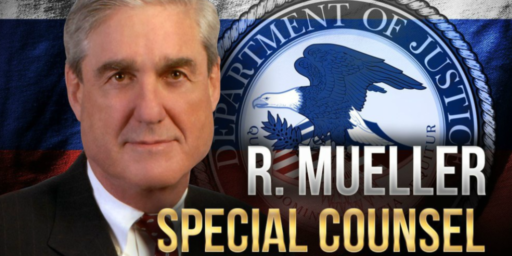
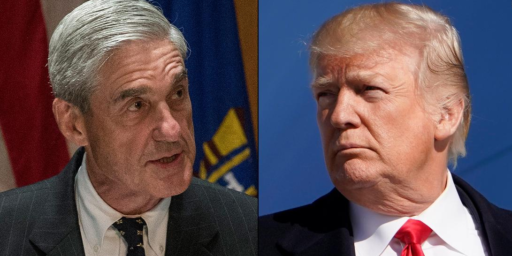

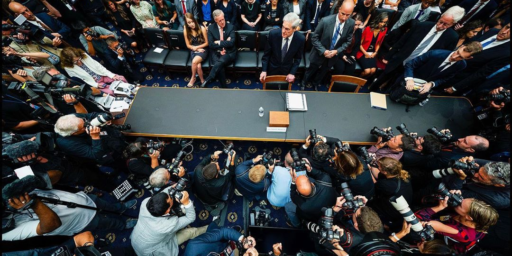
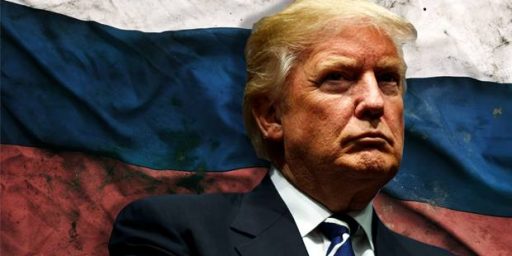
I’d love to hear Harvard92’s opinions on this, but he seems to have gone silent
I wonder if the corporation is Deutschebank, and this is related to Trump money laundering.
@Stormy Dragon: Or Alfa Bank with the mysterious server in Trump Tower. But speculating about the two foreign corporations we’ve heard about out of the hundreds Trump may have committed crimes with seems long odds.
And if there are open questions around foreign law this may end up appealed long after Trump’s left the scene.
Let me share a lesson from my first month in junior high school, at the tender age of 12:
Ford started doing tons of hype in print, radio, and TV ads for their new upcoming line. There was a lot of excited chatter about which car or cars it would prove to be. this went on for weeks.
Finally Ford revealed a line of plain, boring, pick up trucks meant for the rural market.
No doubt these were important to Ford, given the advertising blitz, and money made off selling pick ups is as good as that made from selling a sporty Mustang or a stately LTD. But for most people in the cities, this was much ado about nothing.
It maybe Mueller is after a fat target crucial in El Cheeto’s corrupt schemes, or it may be some obscure data provider needed to tie off loose ends or make an obscure but important connection in some side case.
@Stormy Dragon:
DB is privately owned, I think. The entity here is state-owned.
@Stormy Dragon: Deutschebank is not owned either wholly or majority by the German government though.
Countries that tend to have majority ownership in companies should sort of narrow the field, but then we pretty much end up with China, Russia, and the Middle East. I don’t know enough about Swiss banks to speculate on that angle–are they majority owned by the Swiss government?
I saw a lot of speculation on Twitter that it was Cambridge Analytica, but nope, they are privately owned.
Are there Saudi national banks? Trump is steadfastly defending the House of Saud despite the conclusions of the intelligence community, just as he is for Putin…
@Gustopher:
Public Investment Fund of Saudi Arabia
@Kathy: Yet I have not seen advertising for Ford’s amazing GT40. They should really get the word out about this one and offer test drives – on a track.
@Tyrell:
They should run advertising for a car that stopped production in 1969? Careful buddy, you are playing fast and loose with keeping up this persona :).
@Tyrell: @Neil J Hudelson: correction to 2019 Ford GT, an update to the GT40 of years past. A production car that can go directly to the track. A car that rocks!
https://www.ford.com/performance/gt/
Brings memories of Mark Donahue, Dan Gurney, and Jackie Stewart.
@Tyrell: From what I’ve read about it, they don’t really need to advertise it. In fact, if you make your way up the waiting list and actually get to buy one, you have to sign a contract that you will not resell it for (I think) one year. They actually took an actor to court for reselling it after 3 months. Here’s a link: From Jalopnik
I’d love for someone to explain to me why this isn’t odd and probably not a big deal:
https://www.cnbc.com/2018/12/19/-filing-in-case-of-former-trump-lawyer-michael-cohen.html
The number of mystery filings is sort of strange, isn’t it?
@Tyrell: The GT40 was built for one purpose, so the likes of Dan Gurney and AJ Foyt could beat the best Enzo Ferrari could bring to the track. I forget the story, but Ferrari had somehow pissed off Henry the Deuce. While Ford has successfully raced the second generation GT, the GTs were built as PR exercises and sold as what the Brits used to call crumpet collectors. Not really very interesting cars.
My only bet is it’s a bank, won’t speculate beyond that.
@OzarkHillbilly: Well, where is the fun in that?
I’m even willing to speculate on the defenses that Republicans put up for Trump. “This is gross prosecutorial overreach, far beyond his charter. He was supposed to be looking for treason with the Russians, and if there is one thing we can all agree on, it is that the Saudis are not Russian. And this is hardly treason. Misdemeanor treason, at worst.”
@Jen: I am not aware of any relevant Swiss banking entities . The only ‘state’ ones ex central bank (which is a sovereign and would thus not meet this) would be cantonal banks, but those are hardly relevant here.
By what is cited this could easily be an operating or a holding company that is majority state owned.
None of that is uncommon relative to Asia, to MENA nor to Russia of course. (or indeed uncommon in LatAm or Africa or even EU – so state entity hardly narrows things down. Non-cooperating state owned commercial entity would tend to say MENA or Russia or Asia however)
Another document filed away in the secret vault. I think we have a good idea what this “top secret” file relates to, and it is not Russia or Trump. How many of these sort of actions do we not ever hear about? Who protects us common people from Mueller’s mighty throne ?
@Stormy Dragon: That is not a bank.
Sovereign Wealth Fund. Not the same thing by far.
It could be an entity subject to this although the language quoted suggests a commercial company that is state controlled. I don’t believe the Saudi sov fund is actually legally structured as a company.
The Rule of Law does.
But you are not really interested in a rule of law, you are interested in excusing the abuses with wheezy rhetoric and about zero thought.
Just a minute ago on Fox news they were talking about Obama knowing about Hillary’s emails.
The Republican party is in bad shape, and I don’t see it recovering anytime soon.
“Who protects us common people from Mueller’s mighty throne ?”
We “common people” don’t need any protection from Mueller. We didn’t run for office, are not parts of political campaign organizations, and are not subject to the investigation that Mueller is commissioned for. What were you doing that makes you so afraid?
@Tyrell: “Who protects us common people from Mueller’s mighty throne ?”
Wait, is Mueller coming after you? Do the documents in the vault relate to your financial activities? I thought he was going after the president and the people who enabled his conspiracies. Are you part of that?